Ethereum is the most popular blockchain for smart contract and decentralized application (dapp) development. However, it’s widely known that Ethereum faces significant scalability challenges, making it expensive to use the network. Fortunately, this is where scaling solutions like Polygon (previously known as MATIC Network) enter the equation. Polygon possesses superior features to that of Ethereum, and because of this, the Polygon ecosystem has grown exponentially, attracting users and devs alike. But what exactly is Polygon, and what are some of the most popular dapps on the network? For the answers to these questions, join us in this guide as we explore the intricacies of the Polygon ecosystem!
Overview
We’ll start today’s article by diving straight into the Polygon ecosystem. We’ll explain what Polygon is, how it works, and cover some of the benefits of this network. From there, we will explore some of the most significant dapps on Polygon, such as QuickSwap, Aave, Tangible, and many others. Finally, to top things off, we’ll dive into Polygon development, where we’ll introduce you to Moralis – the industry’s leading Web3 API provider!
With Moralis’ dynamic Polygon API suite, you’ll find the tools you need to build everything from cryptocurrency wallets like MetaMask to block explorers like PolygonScan. Thanks to the accessibility of our APIs, you can seamlessly integrate on-chain data and Web3 functionality into your dapps with single lines of code. As a result, you can build projects faster and more efficiently.

Are you aware that you can access all our industry-leading Web3 APIs for free? So, if you haven’t already, make sure to sign up with Moralis immediately! By signing up, you can start using the full power of blockchain technology today!
Now, without further ado, let’s kick things off by diving straight into the Polygon ecosystem!
What is the Polygon Ecosystem?
Polygon (formerly MATIC Network) launched in 2017, and it is a layer-2 (L2) scaling solution for the Ethereum blockchain. The Polygon ecosystem comprises multiple chains that together host thousands of dapps, including decentralized exchanges (DEXs), non-fungible token (NFT) marketplaces, games, and other Web3 projects!
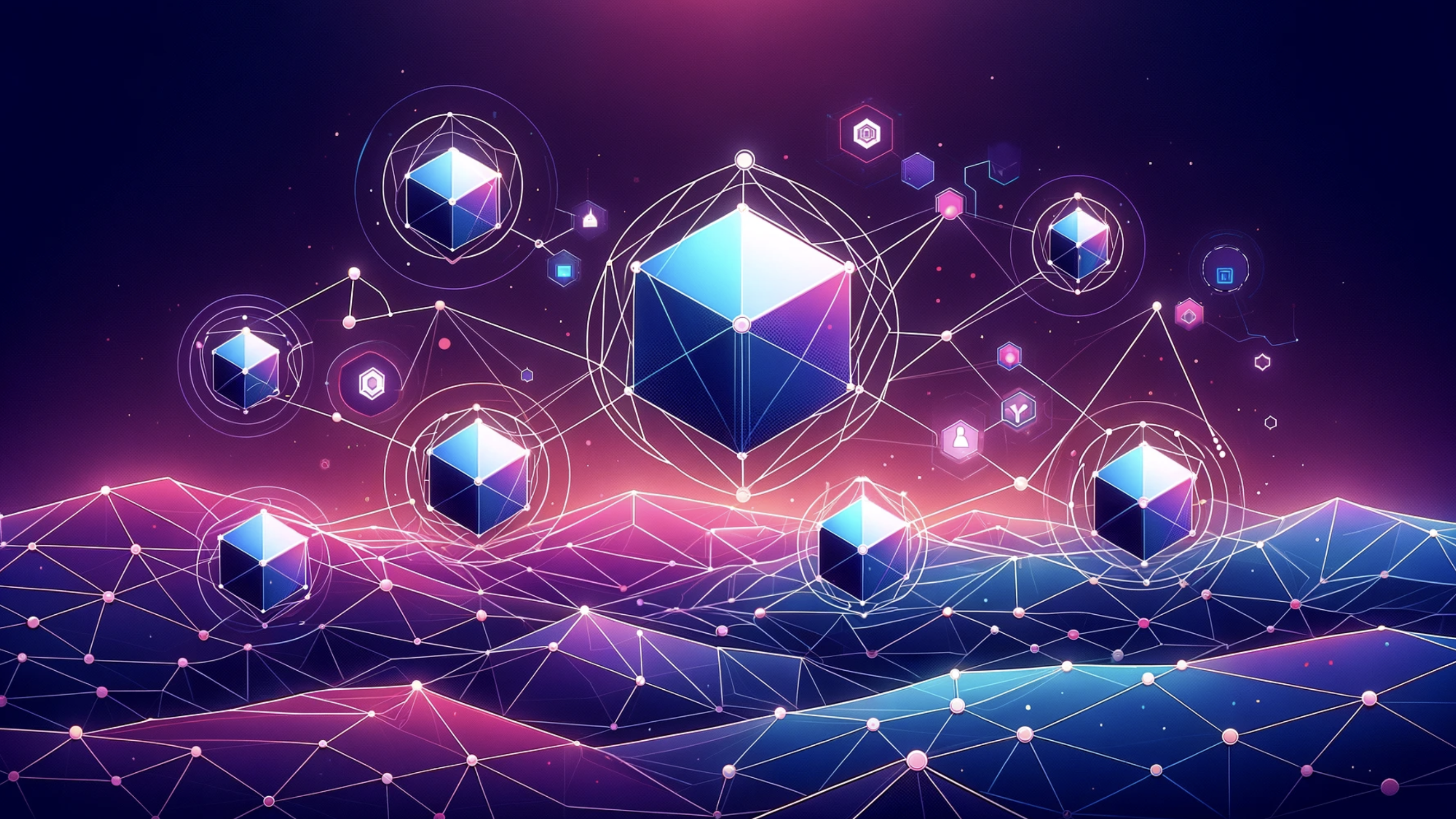
As an L2 scaling solution, the primary purpose of Polygon is to extend the scalability capabilities of Ethereum. Polygon is essentially a set of solutions that operates on top of the Ethereum blockchain to improve transaction speeds and provide lower gas costs.
So, how does this work?
Well, the Polygon ecosystem consists of two main blockchain networks:
- Polygon Proof-of-Stake (PoS): Polygon PoS is the most widely used L2 scaling solution for the Ethereum network. To improve scalability, Polygon PoS leverages a ”plasma” framework to create a sidechain running alongside the Ethereum network.
- Polygon zkEVM: Polygon zkEVM is an EVM equivalent L2 scaling solution that leverages cryptographic zero-knowledge (zk) proofs to bundle transactions off-chain, only to later verify them in a batch on the Ethereum network.
To learn more about these two solutions, check out our article exploring the differences between Polygon Pos vs Polygon zkEVM!
Another essential part of the Polygon ecosystem is the network’s native MATIC token. Apart from acting as a medium of exchange, MATIC has a lot of utility within the ecosystem. For instance, it’s instrumental in governance, plays a key role in ensuring network security, and is also utilized as a means of payment for transaction fees.
Overall, Polygon is an ETH layer-2 scaling solution comprising multiple chains that host a large ecosystem of dapps, tokens like MATIC, and other Web3 platforms!
What are the Benefits of Polygon?
The Polygon ecosystem offers several benefits that address some of the limitations of Ethereum. These advantages have made Polygon a popular choice for Web3 developers and users in the blockchain space. Here are four prominent examples:
- Low Gas Fees: Polygon offers low gas fees, making network transactions significantly cheaper than on Ethereum. This cost-effectiveness is especially appealing for smaller transactions, making Polygon a more feasible option for a broader range of users and applications.
- Fast Transactions: Polygon offers high throughput and fast transaction speeds. For instance, while the Ethereum network can process about 15 transactions per second, Polygon is able to handle thousands within the same timeframe. This is crucial for applications relying on high transaction throughput, such as games and decentralized finance (DeFi) platforms.
- High Security: As an L2 solution, the Polygon network leverages Ethereum’s robust security to keep the network safe and secure.
- EVM-Compatibility: The Polygon ecosystem is compatible with Ethereum Virtual Machine (EVM). Consequently, when building dapps on Polygon, it’s possible to use familiar Ethereum tooling, making Web3 development a breeze.
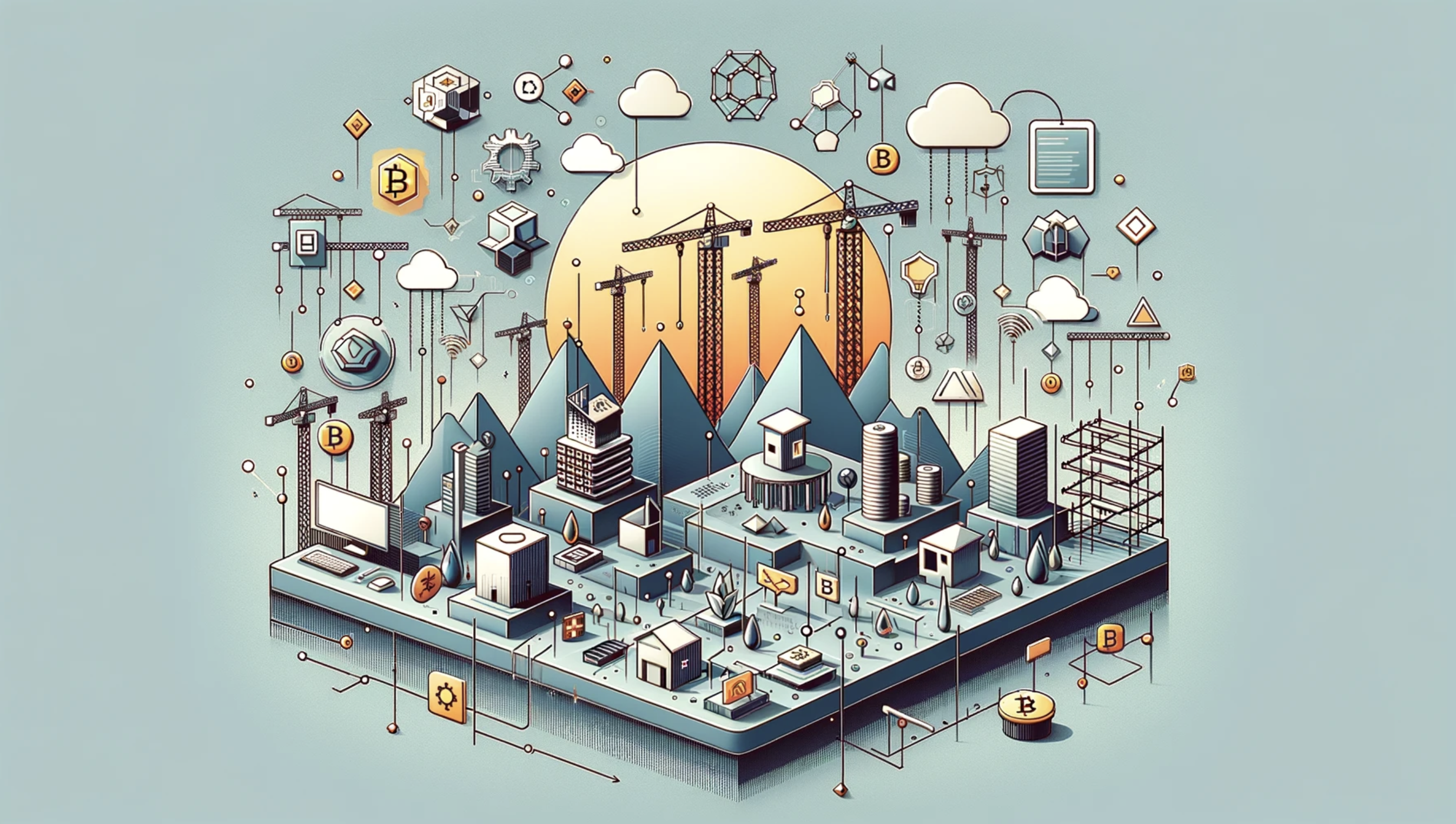
How Many Dapps on Polygon in 2024?
The Polygon ecosystem is vast! Based on the latest public data shared by the network in late 2022, more than 53,000 dapps have been built on Polygon, with roughly 17,800 monthly active projects:
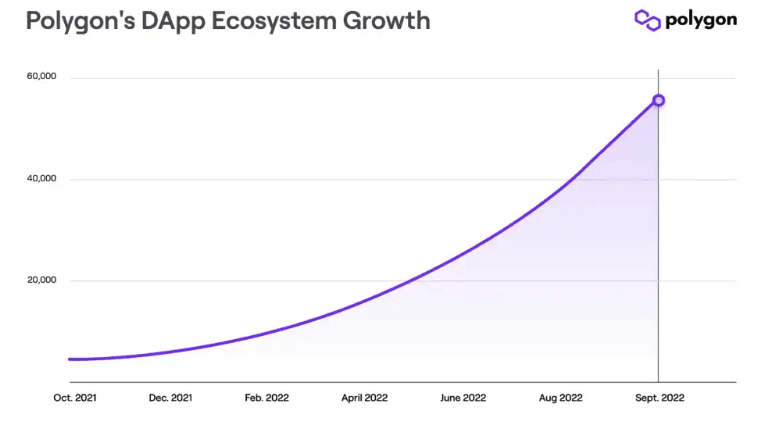
However, not all of these Web3 apps are very polished or useful. This is why Moralis’ Web3 Wiki curates the number of projects on Polygon to ensure all dapps on our page offer value to users. At the time of writing, the Web3 Wiki contains 877 Polygon dapps!
If you’d like to learn more about the biggest dapps on Polygon, join us in the next section as we dive a bit deeper into the ecosystem!
Dapps on Polygon – Exploring the Polygon Ecosystem
As you now know, Polygon hosts a vast ecosystem of dapps. However, we’ll only be able to cover a few examples of well-established and useful projects in this section. More specifically, we’ll briefly introduce ten prominent platforms:
| Dapps on Polygon in 2024 | |||
| Name: | Description: | ||
| 1. QuickSwap | QuickSwap is an industry-leading DEX on the Polygon network, allowing users to swap, stake, and farm cryptocurrencies. | ||
| 2. Uniswap | Uniswap is an automated market maker (AMM) DEX for swapping crypto tokens on Polygon and multiple other chains. | ||
| 3. Aave | Aave is a decentralized lending protocol allowing users to lend, borrow, and earn interest on their cryptocurrency tokens. | ||
| 4. Tangible | Tangible is a DeFi platform enabling users to tokenize real-world assets like gold, real estate, etc., into tangible NFTs (TNFTs). | ||
| 5. OpenSea | OpenSea is the industry’s #1 NFT marketplace, allowing users to effortlessly mint, buy, and sell NFTs. | ||
| 6. Rarible | Rarible is an aggregated marketplace enabling users to create, discover, sell, and buy NFTs. | ||
| 7. MetaMask | MetaMask is an industry-leading, self-custodial Web3 wallet that allows users to store and fully manage their cryptocurrencies and NFTs. | ||
| 8. Trust Wallet | Trust Wallet is a secure, self-custody crypto wallet with 70+ million users. | ||
| 9. Aavegotchi | Aavegotchi is a collectibles game where users can purchase and grow Aavegotchis, which are NFT avatars used to explore the game’s digital universe. | ||
| 10. Sunflower Land | Sunflower Land is a Web3 farming game where players farm crops, collect resources, and build their farming empire. | ||
If you’d like to explore the dapps above further, along with additional platforms not covered in the list, make sure to check our Web3 Wiki page featuring top Polygon dapps!
How to Build Polygon Ecosystem Dapps in 2024
With an overview of the Polygon ecosystem, you might be interested in building your own dapps on the network. If this is the case, then you’ll want to check out Moralis!
Moralis is an industry-leading Web3 API provider, and with our premier interfaces, you can seamlessly integrate on-chain data and blockchain functionality into your dapps with only a few lines of code!
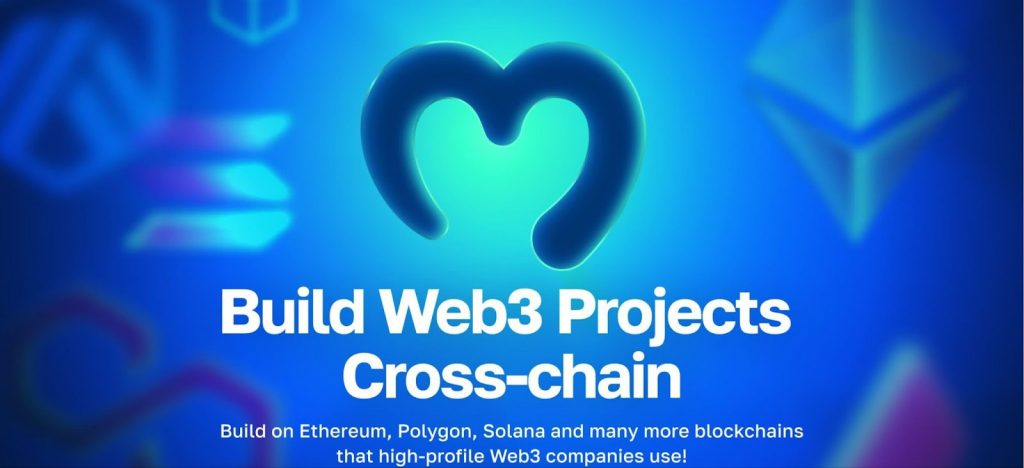
In Moralis’ diverse toolset, you’ll find multiple interfaces for different use cases, including the Wallet API, Token API, NFT API, etc. Consequently, it doesn’t matter if you want to build a crypto wallet, token explorer, or any other Web3 platform; Moralis has got you covered.
But why should you leverage Moralis to build dapps?
- Top Performance: Moralis’ Web3 APIs offer industry-leading response times, making them suitable for new as well as already established projects.
- Save Time: With Moralis, you can build dapps faster, as our APIs have been shown to reduce the average go-to-market time for projects by 83%.
- Cross-Chain Compatibility: All our APIs are chain agnostic, supporting the biggest blockchains out of the box. This includes Polygon, Ethereum, BNB Smart Chain (BSC), Optimism, and many others.
These advantages position Moralis not only as an ideal platform for building new dapps but also as a valuable asset for improving existing projects. For instance, with our industry-leading response times, you can use our APIs to enhance the performance of your dapps. What’s more, with the cross-chain capabilities, you can easily expand your platform across multiple blockchains!
Also, did you know that you can sign up with Moralis for free? As such, if you haven’t already, set up your account so you can start leveraging the full power of blockchain technology today!
Now, to highlight the power of Moralis further, let’s explore three of our APIs in the following subsections!
Wallet API
Moralis’ Wallet API boasts an impressive array of features, unparalleled scalability, and exceptional flexibility, making it the definitive solution for integrating crypto wallet functionality into your dapps. With only single lines of code, you can seamlessly fetch the native balance, NFT balances, real-time transactions, etc., of any wallet!
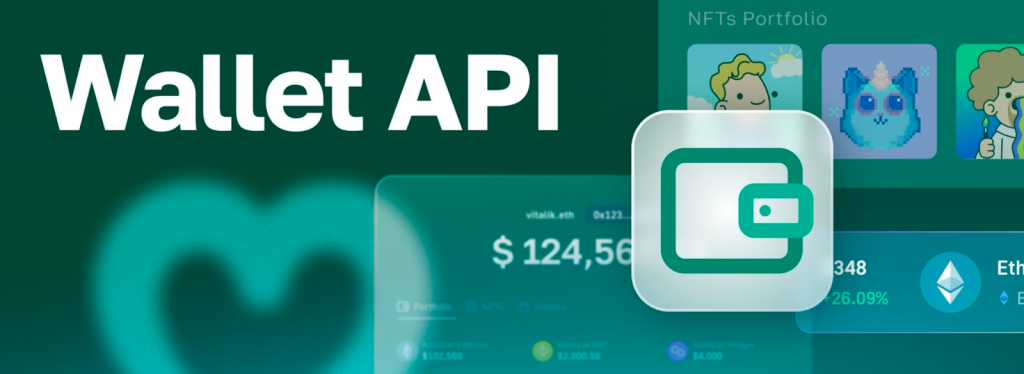
The Wallet API provides additional features, including address labels, fully decoded transactions, profile data, account abstraction support, and much more. Additionally, this premier tool supports 500+ million addresses across all the most significant blockchains.
To highlight the power of the Wallet API, here are three examples of endpoints you’ll likely find helpful when building dapps on Polygon:
getNativeBalance()– Fetch the native balance of any wallet:
const response = await Moralis.EvmApi.balance.getNativeBalance({ "chain": "0x89", "address": "0xE99C0fc7e35c8C33453EcbBff2f0f61BEfaA4Ffd" }); getWalletNFTs()– Get the NFT balance of any wallet:
const response = await Moralis.EvmApi.nft.getWalletNFTs({ "chain": "0x89", "address": "0xE99C0fc7e35c8C33453EcbBff2f0f61BEfaA4Ffd" }); getWalletTransactions()– Fetch the native transaction history of any wallet:
const response = await Moralis.EvmApi.transaction.getWalletTransactions({ "chain": "0x89", "address": "0xE99C0fc7e35c8C33453EcbBff2f0f61BEfaA4Ffd" }); Token API
The Token API lets you seamlessly fetch and integrate ERC-20 token data, including prices, transfers, balances, and much more, into your dapps. As such, when working with this industry-leading interface, you can effortlessly build everything from DEXs to token explorers without any hassle!
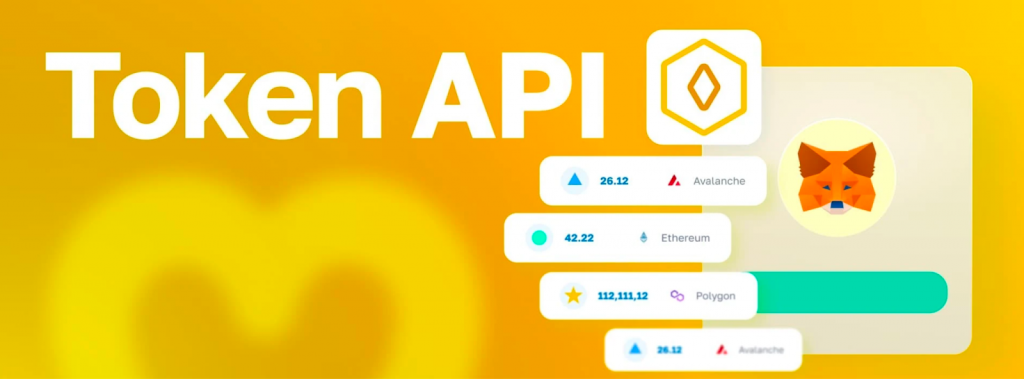
The Token API supports every single token across all the biggest chains, including Polygon, Ethereum, BSC, Arbitrum, and others. This means you can use this tool to fetch data about everything from stablecoins like USDT to meme coins like PolyDoge.
Here are three endpoints of the Token API to showcase the power of this industry-leading API:
getTokenPrice()– Get the price of any token:
const response = await Moralis.EvmApi.token.getTokenPrice({ "chain": "0x89", "address": "0x1BFD67037B42Cf73acF2047067bd4F2C47D9BfD6" }); getTokenMetadata()– Fetch the metadata of any fungible token:
const response = await Moralis.EvmApi.token.getTokenMetadata({ "addresses": [ "0x1BFD67037B42Cf73acF2047067bd4F2C47D9BfD6" ], "chain": "0x89" }); getTokenTransfers()– Query all the token transfers of a contract:
const response = await Moralis.EvmApi.token.getTokenTransfers({ "chain": "0x89", "address": "0x1BFD67037B42Cf73acF2047067bd4F2C47D9BfD6" }); NFT API
With Moralis’ NFT API, you can fetch NFT metadata, balances, optimized image previews, and much more with only single lines of code. Consequently, this API takes care of all your NFT needs, allowing you to build Web3 games, NFT marketplaces, and much more!
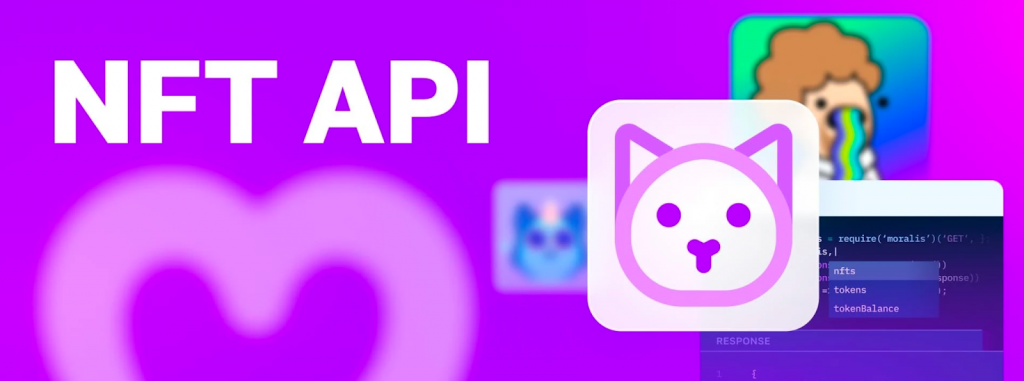
The NFT API supports more than three million collections across all the biggest blockchains. This includes everything from established Polygon projects like Aavegotchi to new tokens that dropped just seconds ago.
Here are three NFT API endpoints you’ll likely find useful in your Web3 development endeavors:
getNFTMetadata()– Get the metadata of any NFT:
const response = await Moralis.EvmApi.nft.getNFTMetadata({ "chain": "0x89", "address": "0x86935F11C86623deC8a25696E1C19a8659CbF95d", "tokenId": "1" }); getWalletNFTs()– Fetch the NFT balance of any wallet:
const response = await Moralis.EvmApi.nft.getWalletNFTs({ "chain": "0x89", "address": "0xE99C0fc7e35c8C33453EcbBff2f0f61BEfaA4Ffd" }); getNFTTrades()– Query all NFT trades by marketplace:
const response = await Moralis.EvmApi.nft.getNFTTrades({ "chain": "0x89", "marketplace": "opensea", "address": "0x86935F11C86623deC8a25696E1C19a8659CbF95d" }); If you’d like to explore all our industry-leading APIs, make sure to check out the official Web3 API page!
Also, don’t forget to sign up with Moralis if you want to leverage the APIs above yourself. You can create an account without paying a dime, and you’ll be able to start leveraging the full power of blockchain technology today!
Summary: Exploring the Polygon Ecosystem – Full Guide to Dapps on Polygon
In today’s article, we explored the Polygon ecosystem (formerly MATIC Network). In doing so, we learned that it’s a popular L2 scaling solution for Ethereum that comprises multiple chains, including Polygon PoS and Polygon zkEVM. What’s more, we also discovered that Polygon’s native MATIC token plays an essential role within the ecosystem!
From there, we then briefly explored the following ten Polygon ecosystem dapps:
- QuickSwap
- Uniswap
- Aave
- Tangible
- OpenSea
- Rarible
- MetaMask
- Trust Wallet
- Aavegotchi
- Sunflower Land
Lastly, we introduced you to Moralis, which is the ultimate platform for anyone looking to build dapps on Polygon!
If you liked this Polygon ecosystem guide, consider reading more content here on Moralis’ Web3 blog. For instance, learn how to index blockchain data or explore our multisig wallet article.
Also, before you move on, remember that you can sign up with Moralis for free. So, take this opportunity to create an account, and you’ll gain instant access to all our industry-leading Web3 development tools!
Read More: moralis.io

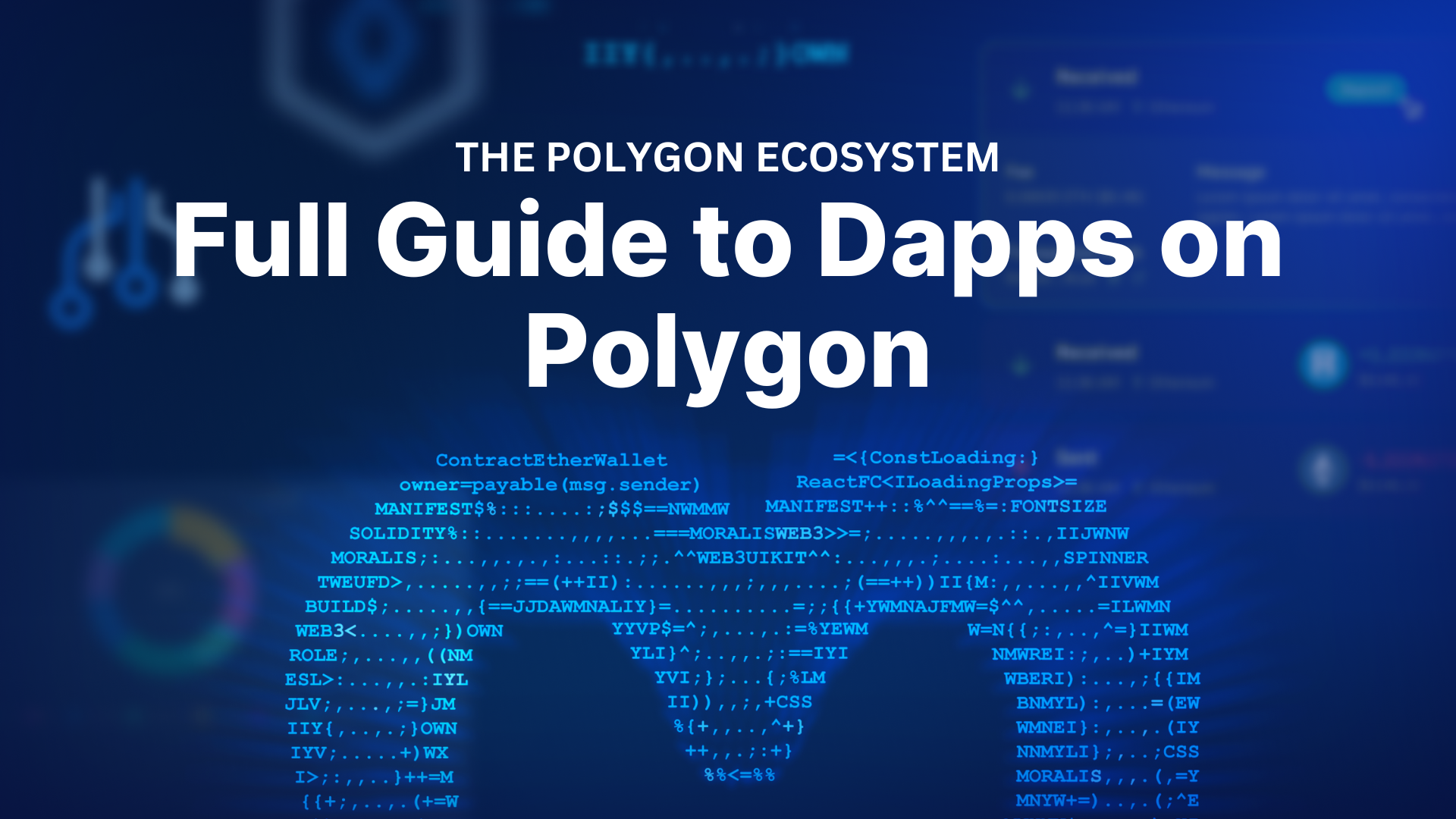







 Bitcoin
Bitcoin  Ethereum
Ethereum  Tether
Tether  XRP
XRP  Solana
Solana  USDC
USDC  Dogecoin
Dogecoin  TRON
TRON  Cardano
Cardano  Lido Staked Ether
Lido Staked Ether  Wrapped Bitcoin
Wrapped Bitcoin  Hyperliquid
Hyperliquid  Sui
Sui  Wrapped stETH
Wrapped stETH  Chainlink
Chainlink  Avalanche
Avalanche  Stellar
Stellar  Bitcoin Cash
Bitcoin Cash  Toncoin
Toncoin  LEO Token
LEO Token  Shiba Inu
Shiba Inu  Hedera
Hedera  USDS
USDS  WETH
WETH  Litecoin
Litecoin  Wrapped eETH
Wrapped eETH  Monero
Monero  Polkadot
Polkadot  Binance Bridged USDT (BNB Smart Chain)
Binance Bridged USDT (BNB Smart Chain)  Ethena USDe
Ethena USDe  Bitget Token
Bitget Token  Pepe
Pepe  Pi Network
Pi Network  Coinbase Wrapped BTC
Coinbase Wrapped BTC  WhiteBIT Coin
WhiteBIT Coin  Aave
Aave  Uniswap
Uniswap  Bittensor
Bittensor  Dai
Dai  Ethena Staked USDe
Ethena Staked USDe  Aptos
Aptos  Cronos
Cronos  NEAR Protocol
NEAR Protocol  OKB
OKB  Jito Staked SOL
Jito Staked SOL  BlackRock USD Institutional Digital Liquidity Fund
BlackRock USD Institutional Digital Liquidity Fund  Internet Computer
Internet Computer  Ondo
Ondo  Ethereum Classic
Ethereum Classic